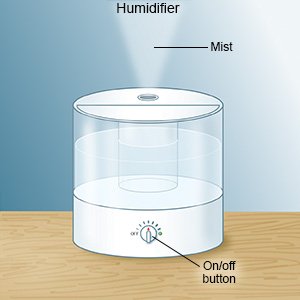Nosebleed in Children
Medically reviewed by Drugs.com. Last updated on Aug 4, 2025.
What do I need to know about a nosebleed?
A nosebleed, or epistaxis, occurs when one or more of the blood vessels in your child's nose break. He or she may have dark or bright red blood from one or both nostrils. A nosebleed can be caused by any of the following:
- An object stuck in your child's nose
- Trauma from your child picking his or her nose or a direct blow to his or her nose
- Cold, dry air
- Irritation or inflammation from a cold, respiratory infection, or allergies
How is a nosebleed diagnosed?
Your child may need any of the following:
- A nasal exam may show blood clots or swelling. Your child's healthcare provider will use an instrument called a speculum to check the inside of your child's nose. This gently opens your child's nostrils so the provider can see what part of his or her nose is bleeding.
- A nasal endoscopy is a deeper exam of the inside of your child's nose. Your child's healthcare provider uses a scope (thin, flexible tube with a light and camera on the end) to see further into your child's nose.
What first aid should I do for my child's nosebleed?
- Have your child sit up and lean forward. This will help prevent him or her from swallowing blood. Have your child spit blood and saliva into a bowl.
- Apply pressure to your child's nose. Use 2 fingers to pinch his or her nose shut for 10 to 15 minutes. This will help stop the bleeding.
- Apply ice on the bridge of your child's nose for 15 to 20 minutes every hour or as directed. Ice helps decrease swelling and bleeding. Use a cold pack or put crushed ice in a plastic bag. Cover it with a towel to protect your child's skin.
- Gently pack your child's nose with a cotton ball, tissue, tampon, or gauze bandage to stop the bleeding.
Related medications
How is a severe nosebleed treated?
- Medicines may be applied to a small piece of cotton and placed in your child's nose. Medicine may also be sprayed in or applied directly to your child's nose.
- Cautery is when a chemical or electric device is used to seal the blood vessels. This may be done to stop bleeding or prevent more bleeding. Local anesthesia may be used.
How can I help prevent another nosebleed?
- Keep your child's nose moist. Put a small amount of petroleum jelly inside your child's nostrils as needed. Use a saline (saltwater) nasal spray. Do not put anything else inside your child's nose unless his or her healthcare provider says it is okay. Do not use oil-based lubricants if your child uses oxygen therapy. They may be flammable.
- Use a cool mist humidifier or vaporizer to increase air moisture in your home. This will help your child's nose stay moist.

- Remind your child to not pick or blow his or her nose too hard. Keep your child's nails trimmed short to decrease trauma from nose picking. Remind him or her to try not to sneeze. Blowing his or her nose too hard or sneezing may cause the bleeding to start again.
- Have your child wear appropriate, protective gear when he or she plays sports. This will help protect your child's nose from trauma.
When should I seek immediate care?
- Your child's nose is still bleeding after 20 minutes, even after you pinch it.
- Your child has trouble breathing or talking.
- Your child has a foul-smelling discharge coming out of his or her nose.
- Your child says he or she is dizzy or weak, or has trouble standing up.
When should I contact my child's healthcare provider?
- Your child has a fever and is vomiting.
- Your child has pain in and around his or her nose.
- You have questions or concerns about your child's condition or care.
Care Agreement
You have the right to help plan your child's care. Learn about your child's health condition and how it may be treated. Discuss treatment options with your child's healthcare providers to decide what care you want for your child. The above information is an educational aid only. It is not intended as medical advice for individual conditions or treatments. Talk to your doctor, nurse or pharmacist before following any medical regimen to see if it is safe and effective for you.© Copyright Merative 2025 Information is for End User's use only and may not be sold, redistributed or otherwise used for commercial purposes.
Further information
Always consult your healthcare provider to ensure the information displayed on this page applies to your personal circumstances.
